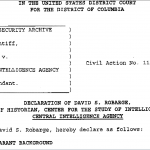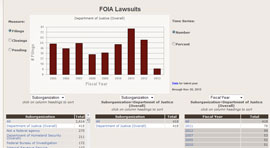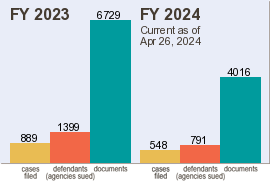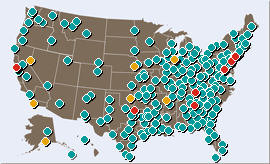CIA Responds to FOIA Failure Designation
The Central Intelligence Agency says that the fifth and final volume of a multi-volume history of the agency’s role in the Bay of Pigs Operation is not part of the Official History of the Bay of Pigs sought by the National Security Archive. It notes that two district court judges and an appellate court panel have agreed with the agency’s stance that Volume 5 is predecisional and part of the agency’s deliberative process. Therefore, it is properly exempt from disclosure under FOIA’s B5 Exemption.
The Archive nominated its battle with the CIA to get this multi-volume history for the FOIA Project’s FOIA Failure contest. The FOIA Project asked the Archive and five others who have brought multiple FOIA suits against the government to select a suit they felt represents a particularly egregious example of a failure to adequately comply with a FOIA request. The FOIA Project then asked the public to vote on the “worst of the worst” during Sunshine Week. The voting closed Friday morning (3/20/2015). The Archive’s case against the CIA was voted the winner, with 68 of 264 votes, one vote ahead of the second-place finisher, a case involving official assessments of the damage caused by the Edward Snowden leaks.
On Friday evening, at the request of the FOIA Project, CIA spokesperson Ryan Trapani provided this statement via e-mail:
“All four volumes of the Official History of the Bay of Pigs have been reviewed, declassified, and posted for the public on the CIA website. Those volumes and thousands of other documents are available at http://www.foia.cia.gov/. With respect to the draft documents sought by the National Security Archive, the D.C. Circuit Court of Appeals last year ruled that they were in fact, pre-decisional and deliberative, and therefore, exempt from release under the deliberative process privilege.”
Trapani’s statement that the four volumes released to the Archive constitute the entire Official History underscores the Agency’s contention that Volume 5 is different because it was never approved for publication by the author’s supervisors, a position that is further elaborated on in this declaration from CIA Chief Historian David S. Robarge. It’s a stance that the federal courts agreed with on multiple occassions, including when the author of the volume himself, Jack B. Pfeiffer, tried to get the work released in an earlier FOIA case. That decision was cited in both the district court’s and the appellate court’s decisions in the National Security Archive v. Central Intelligence Agency case.
The Archive’s Nate Jones, however, says that the court decisions do not alter the Archive’s belief that the documents should be in the public domain. He notes that Pfeiffer himself, who had been entrusted with the assignment of creating the Official History, considers Volume 5 part of the work. As such, whether or not his supervisors approved it has little bearing on whether now, 50 years later, it would add to the historical record. Clearly, Jones said, it would. Moreover, Robarge’s assertion in his declaration that the release of Volume 5 would cloud the historical record and confuse the public is particularly troublesome. As Jones wrote in a post for the Archive blog Unredacted, “Americans – who funded the operation and Dr. Pfeiffer’s histories– have the right to read this document and decide for themselves its merits.”
Additionally, Jones said, the argument over Volume 5 has no bearing on the CIA failing to produce any documents, including the volumes the CIA eventually determined were fit for release, until after the Archive sued.

 Recent Tweets
Recent Tweets


